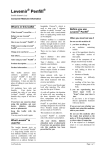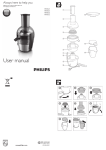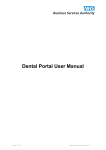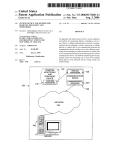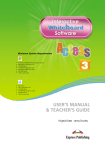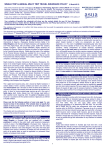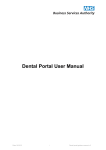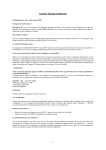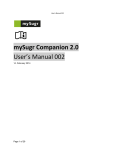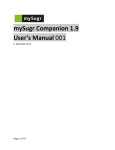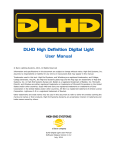Download Type 2 and You
Transcript
June 2015 Newsletter, Issue 23 Type 2 and you PO Box 294 Northampton NN1 4XS Telephone: 01604 622837 Welcome Welcome to the twenty-third issue of Type 2 and You. In this issue we look at how to manage your diabetes when you are on holiday and generally over the summer months, medical exemption certificates and advice on fasting over Ramadan. We also announce the date of our Annual General Meeting and offer you the chance to win a years’ supply of Pomegreat juice drink. Launching our Parents Passport for Schools IDDT is a charity that actively listens to its members and is all too well aware of the difficulties that children with diabetes and their parents and families face in everyday life when managing the condition. One area that proves particularly problematic is managing the condition at school. With this in mind, IDDT has produced a new, free booklet, a Parents Passport for Schools. The passport has been designed to provide a means by which parents can formally let schools know how to manage their child’s diabetes and in turn support schools to comply with SEN regulations, as well as informing teachers about the condition. IDDT has produced similar documents for use in hospitals and also in care settings, such as residential care which have been very well received and proved very popular. As with all our leaflets, the passport is FREE. DIABET PASSPO ES – PARENTS RT FOR SCHOO This pas sport is LS to assist my child ’s school st aff in mee diabetes ting needs IT GIVES SCHOO L STAFF ABOUT IMPORT MY CH EVERYO ILD AND SHOUL ANT INFORMAT NE RESP ION ONSIBL D BE AVAILABL E FOR TH E EIR CARE TO A charity supporting and listening ww w.idd tinterna tional.o to people who live with dia betes rg enquirie s@iddtin ternatio nal.org The passport contains a wide range of information on how a child’s diabetes is managed, including: • Dealing with high and low blood sugar levels. • Food and mealtimes. • Insulin administration and blood testing. IDDT hopes that the passport will prove to be a valuable tool for families with a child with diabetes, teachers with a child with diabetes in their charge, school nurses and SEND co-ordinators. To get your FREE copy call IDDT on 01604 622837, write to IDDT at PO Box 294, Northampton NN1 4XS or email [email protected] A charity supporting and listening to people who live with diabetes www.iddtinternational.org [email protected] Holiday Tips Whether going on holiday abroad or in this country, it may be the first time you have travelled since your diabetes or your child’s diabetes was diagnosed. IDDT produce a holiday pack that provides a whole range of information and tips. If you would like a pack then get in touch using the contact details at the end of the newsletter. In the meantime, here is a sample of some of the information provided in the pack. General Tips • Excitement can affect blood glucose levels, so it is important to test regularly and be prepared for some low blood glucose levels. • Hypos may be unexpected due to changes in routine, in temperatures or in the amount of exercise taken, such as swimming or sightseeing, so always be prepared. It is a good idea to take plenty of glucose tablets with you because they won’t melt, leak or become sticky in high temperatures. • When travelling always wear identification that states you have diabetes, especially if you take insulin, and if possible, gives an emergency telephone number. Precautions when travelling by air Insulin should not be packed in your suitcase. This will be placed in the hold where the temperature can be below freezing and this is likely to damage your insulin. Your blood glucose meter should also not be packed in the hold. • C arry two lots of insulin, testing equipment and syringes/ pens and distribute them between two different lots of hand luggage. Luggage does get lost and it could prove difficult to replace your diabetes equipment. • You should always carry a card to say that you or your child has diabetes. You will need a letter from your GP to explain that you have to carry insulin and other diabetes equipment on board with you. Once you have this letter, it can be used again for future trips. It is a good idea to make several copies of this letter. • Always take more insulin than you need in case of breakages. The country that you are travelling to may not have the type of insulin you need. It is also a good idea to take an extra prescription with you, just in case. • When you come home it is sensible to throw away the insulin you took on holiday as heat, bright light and vibration can all damage it and make it less effective. • It is worth remembering that ordering a ‘diabetic’ meal on flights often means that they are low in carbohydrates, so it is probably not a good idea. On long journeys it is a good idea to have snacks to hand in case there are long periods without meals. Beating jetlag Travelling across several time zones will probably cause some degree of jet lag. Symptoms include daytime sleepiness, fatigue, disorientation, poor concentration, headache and irritability. There are a number of ways to relieve jetlag: • Avoid caffeine and alcohol on the plane - drink plenty of water or fruit juice. 2 June 2015, Issue 23 • Eat modestly at times that correspond to the usual mealtimes as this will help your body to readjust to the new time zone. • After a westward flight, stay awake while there is daylight and try to sleep when it is dark. • After an eastward flight, get up in the morning but avoid bright light and go outdoors in the afternoon. • Take moderate exercise, perhaps by sightseeing. Holiday Insurance If you or your child has diabetes, travel agents are not the best people to provide holiday insurance. Shop around but always declare your diabetes and any other medical conditions, otherwise you may not be covered if anything goes wrong and you need to use the insurance. If you are going on holiday in Europe, remember to take your European Health Insurance card (EHIC) and proof of being a UK resident eg driving licence. The EHIC is available at the Post Office or online at http://www.applyehic.org/applynow.html Tips from readers We collect tips from our members to pass on. Here’s a tip from a couple who regularly fly abroad to Italy and France and although the lady carries medical equipment relating to her diabetes, her husband has a medical condition that requires him to carry equipment that includes a small pair of scissors. As advised he carries a letter from his GP, as should anybody carrying insulin pens, syringes blood testing equipment and any sharps. This had proved to be fine when flying into major airports. However, when they flew into a more provincial airport where the customs officers did not understand the letter as they could not read English, this resulted in an unpleasant and unnecessary search both his body and luggage. On their return home, they were talking to their son about the experience and he advised that they use Google Translator ( http://translate.google. co.uk/?hl=en&tab=wT ) to get French and Italian versions of the letter. Since then they have flown to several provincial airports and have had no further problems. So, if you are travelling abroad and taking diabetes supplies with you, then get the letter you have from your GP translated into the relevant language to avoid any potential problems. Another of our members regularly flies to Thailand and he advises notifying airports in advance that you will be carrying medication and sharps. His second piece of advice applies to anyone travelling to hot countries to purchase a digital thermometer that not only tells you the current temperature but also records the highest and lowest temperatures. This can then be placed in the fridge alongside supplies of insulin and used to adjust the temperature of the fridge to ensure it is running at the optimum temperature for storing insulin. The Golden Rules - with or without diabetes Obtain comprehensive travel insurance, and read the small print. Research your destination – know the local laws and customs. Tell someone where you are going and leave them emergency contact details. Take enough money and have access to emergency supplies. Finally, coping with diabetes and the heat of summer rink plenty of water as •D dehydration can raise blood glucose levels. • S unburn can raise blood glucose levels, so avoid spending long hours in the sun and wear sunscreen of at least 30 SPF and children or people with pale skin should use 50 SPF. • S hield you meter from the sun and test strips should be kept in a cool, dry place. • P eople who use a pump may need to protect the adhesive patch from perspiration by using an antiperspirant at the contact site. • In very hot weather insulin is absorbed more quickly, so test regularly to avoid hypos. Perhaps worth remembering… It is a holiday, so enjoy it! Our holiday pack also contains information and advice on keeping your insulin cool, advice for pump users, managing changing time zones and avoiding Diabetic Holiday Foot Syndrome among other things. If you would like a one of our holiday packs please call IDDT on 01604 622837, write to IDDT at PO Box 294, Northampton NN1 4XS or email [email protected] 3 IDDT News Exemption The IDDT Lottery We would like to thank all the people who have joined in the IDDT monthly Lottery – over 200 entries at the time of writing the 1st prize will be at least £115.00, 2nd prize over £85.00, 3rd over £55.00 and 4th over £25.00. The Lottery draw for June will take place at the end of the first week in July, so there’s still time to enter – just fill in the form which is with this Newsletter. The winners will be contacted directly and will be announced on our website and in the next Newsletter. Diabetes Food, Meds and More With summer coming we can look forward to lighter recipes for the warmer weather. So you might like to look at IDDT’s recipe book. It is available to members at the reduced price of £7.99 plus £1.50 P&P. To order, call IDDT on 01604 622837, write to IDDT at PO Box 294, Northampton NN1 4XS or email [email protected] he I suppEorNtDtENT The new IDDT Tax Disc As you will be aware the old paper tax discs are being phased out this year but instead of throwing away your old tax disc holder, use it to show your support for IDDT - ask for your FREE IDDT TAX DISC using the contact details at the end of this newsletter. INDEP BETES DIA ST TRU The disc is the same size as the old disc and is even perforated – so show your support for us and ask for your IDDT tax disc today! free prescriptions (England) If you are over 18 and under 60, living in England, and you use insulin or medicine to manage your diabetes you are entitled to free prescriptions but you must have a medical exemption certificate. (Prescriptions are free for everybody in Scotland, Wales and Northern Ireland) There has been a ‘crackdown’ on people with diabetes claiming free prescriptions without an exemption certificate and this has led to some people being fined up to £100 and more. If you have been issued with a fine and received no reminder letter, then you can call the NHS BSA and explain this to them – the telephone number is 0300 330 9291. Just a note: From an answer to a Parliamentary Question (end of January 2015) it appears that from 17 September 2014 to 16 January 2015, 5,572 patients have paid a penalty charge in full, with a further 2,252 patients opting to pay the penalty charges in instalments. Unbelievable!!!! Family support It is well known that a lot of people often do not take their medicines as they are supposed to, people with diabetes being no exception. Sometimes people cut back on taking their medicines or even stop taking them altogether or they simply forget to take them. A recent study involving 91 people with Type 2 diabetes found that having good support from the family leads to higher adherence to medicines and fewer cognitive disorders. (High blood sugars from not taking medication may cause cognitive decline.) The people in the study were separated into two groups and in one of the groups, the key family members received educational support and the others did not. In the group where educational 4 June 2015, Issue 23 Certificates Why is this happening now? The NHS Business Services Authority (NHS BSA) issues and renews medical exemption certificates and has been issuing reminders since 2002. • If you were registered for a certificate then, or have been registered since then, you should receive reminders to update your certificate. • However, if you did not have a certificate in 2002 or you have moved without registering your new address, then you will not be on the NHS BSA’s system and you will not have received any reminder letters. Until 2014 the responsibility for checking exemption from paying prescriptions was carried out locally but in 2014, this was transferred to the NHS BSA with a more thorough checking system. This has resulted in fines being issued to a lot of people, many of whom have had diabetes a long time without ever realising they needed a certificate. Pharmacists have a responsibility to check that you have an exemption certificate when you collect your prescription but up to now, this has not been done very thoroughly. What now? A new process has been introduced whereby if someone has made a claim for medical (or maternity) exemption and there is no evidence they hold an exemption certificate, they will still receive a penalty charge. However, this can be cancelled if they submit a valid application for a medical (or maternity) exemption certificate within 60 days of the receipt of the penalty charge notice. Where a penalty surcharge has already been paid, a payment equal to the amount of the surcharge will be refunded but not the cost of the prescription. How to obtain a medical exemption certificate • Obtain form FP92A from your GP surgery. • Complete the form and return it to your GP for signing and the surgery will send it off. • If you do not have a certificate or your application is being processed, you will need to pay for your prescription. Ask your pharmacist for a FP57 receipt and refund claim form so that you will be able to claim the money back once your certificate has been issued. (It is backdated by a month from when it is issued.) The certificate is valid for 5 years and you should receive a renewal reminder letter a month before it expires. If you move house, remember to inform the NHS BSA! To pay a fine, see the rules on having a certificate or to contact the service, go to the NHS NBA website http://www.nhsbsa.nhs.uk/PrescriptionServices/4666.aspx helps people to take their meds support was given, the researchers found that the participants who had cut back or discontinued taking their medication dropped from 46% to 2.2%. In the group where no educational support was given to families, these figures were 39.1% and 26.1% respectively. The group whose family received educational support were also less likely to forget to take their medication, decreasing from 91.1% to 22.1% but in the group whose family received no support, this figure increased from 73.9% to 80.4%. So this study, albeit relatively small, showed that family support may encourage people to take their medicines as they are supposed to do and this results in better control of blood sugars and cognitive improvement. (Journal of Diabetes & Metabolic Disorders, December 2014). As a partner or parent of someone with diabetes, we may feel we are ‘nagging’ and the person with diabetes may feel they are being ‘nagged’ but it is worth remembering that there appear to be real benefits! 5 Four new blood glucose test sites with the same response time as finger tips The common belief, presently held by many endocrinologists, is that blood taken from finger tips for monitoring blood glucose levels is more current and accurate than blood drawn taken from other sites, such as the forearm, shoulder and stomach. Sadly for many people with diabetes the fingertips have the most pain nerves which causes discomfort as well as leaving the finger tips bruised, calloused and with reduced sensitivity. Researchers have found four new test sites that appear to give the same response time and accuracy as finger tips. These sites are located on the fleshy area of the palms, on a line between where the thumb joins the palm and the centre of the wrist and fleshy area along a line connecting where the pink area joins the palm to the wrist. To prove this, the researchers carried out tests in people without diabetes, people at risk of Type 2 diabetes and those with diabetes under control. The tests consisted of simultaneously taking blood samples from alternate sites, such as the forearm, fingertips and from the palm areas mostly after rising from a night’s sleep. Repeated tests were carried out at 5 and 10 minute intervals. Blood glucose levels on the palm areas of both hands consistently matched those on the finger tips well within meter accuracy. However, the other sites, forearm, shoulder and stomach lagged behind the palm areas by 22 minutes but also only reached 70% of the rise from static levels to peak levels. So this study suggests that the palm areas are suitable alternatives to finger ends because they are equally accurate and have less pain nerves. Using these areas also allows finger ends to heal and regain sensitivity. Important warning – if you are considering trying testing using these new sites, it is important to talk to your doctor before doing so to ensure that there are no special reasons why you should not do so. Can I use my blood glucose meter for alternate site testing? Alternate site testing is not possible with all blood glucose meters. Newer machines only require a smaller drop of blood to provide accurate blood glucose readings from other parts of the body. The user manual for blood glucose meters will outline which other sites in the body can be used to obtain a blood sample. Ramadan Fasting & Diabetes Ramadan is based on the ninth month of the lunar calendar, so this year it is expected that the fast of Ramadan will commence on Thursday 18th June and will end on Friday 17th July. During this month it is expected that Muslims who participate will abstain from food, water, beverages, smoking, oral drugs and sexual intercourse from sunrise to sunset. Ramadan moves forward each year by about 11 days which means the length of fasting is greater at certain times of year than others. The length of fasting has special consequences for people with diabetes, especially those taking insulin and the risk of complications increases with longer periods of fasting. People with diabetes may be exempted from fasting but the majority of people with diabetes do fast. Those who fast during Ramadan can have acute complications, such as hypoglycaemia, hyperglycaemia, diabetic ketoacidosis and dehydration, most of which are as a result of a reduction of food and fluid intake and the timing of meals. There are no evidence-based guidelines for safe fasting so people have to rely on expert advice from doctors and their personal experiences. However, a study in people with Type 6 June 2015, Issue 23 Saxenda makes progress in Europe 1 and Type 2 diabetes carried out in Pakistan has shown that with active glucose monitoring, alteration of drug dosage and timing, dietary counselling and patient education, the majority of patients did not have any serious acute complications during Ramadan. Two educational sessions were given to patients, one about drug dosage and timing and one about dietary and lifestyle modifications. Patients were asked to test their blood glucose levels twice daily for at least 15 fasting days with one test being during the fasting period. Following these education sessions and the advice given the researchers found that the majority of people did not have any serious acute complications – none developed diabetic ketoacidosis and the highest frequency of hypo- and hyperglycaemia occurred before dawn. [Diab. Med. 29, 709-715 (2012) The findings of this and other studies suggest that people with Type 1 and Type 2 diabetes should have an assessment with their diabetes team before Ramadan about drug/insulin adjustments, exercise and awareness of the risks of hypo- and hyperglycaemia. If they are ill during the fasting, then they should seek advice from their diabetes team. We reported in March this year that Novo Nordisk’s Saxenda had received marketing approval in the US. It has now received approval in Europe and is expected to be on the market during 2015. Saxenda is the drug liraglutide (the same as Victoza for the treatment of Type 2 diabetes) but is given in a 3mg dose whereas Victoza is given as a 1.2mg dose. Saxenda is approved for the treatment of obesity alongside a reduced calorie diet, increased physical activity in adults with a BMI of 30 or more (obese) or 27 to 30 (overweight) and with at least one other weight related problem. Treatment should be stopped if weight loss does not reach 5% of the starting weight after 12 weeks. The company has stated that it will not seek state reimbursement for the product but prefers to market it for private prescribing (Practical Diabetes, Vol. 32 No.2). Whether this will apply in the UK is not clear yet. We would like to thank everyone who helps IDDT by using Recycle4Charity. Unfortunately from April 1st 2015 there has been a policy change regarding mobile phones. Due to Royal Mail’s policy changes in prohibited goods, mobile phones via Freepost bags can no longer be accepted and Royal Mail will make a surcharge to Recycle4Charity for each phone sent via Freepost. Clearly this means that any benefit to IDDT will be lost as this surcharge will be passed on to IDDT. This policy does not affect the donation or ability to recycle inkjet cartridges through the Freepost recycling envelopes, so please keep these coming to continue to help us raise funds. If you would like Freepost recycle envelopes, just call IDDT on 01604 622837 or email [email protected] A Date for your Diary Although we won’t be having a conference again this year we will still be holding our Annual General Meeting. The meeting is free to attend and will be held on Saturday 17th October at the Kettering Park Hotel, Kettering. The meeting will start at 12.30pm and we will provide a sandwich lunch, discussion sessions and our speaker will once again be Dr Gary Adams. (It would be helpful for catering numbers if you could let us know if you are coming) So we hope that many of you will still be able to join us for the afternoon. More details will be available in the September 2015 issues. 7 IDDT comments on the NHS Diabetes Prevention Programme The Independent Diabetes Trust welcomes the announcement of the National NHS Diabetes Prevention Programme as the increase in Type 2 diabetes is major problem for both people who develop it and for the NHS. However, we need to know more specific details about how the programme will work. There are many unanswered questions. For example, helping people to change their lifestyle requires education and ongoing support because evidence suggests that without ongoing support, people simply revert to their previous habits. A further important question is where will the resources come from? Clearly, such an ambitious programme will require additional resources, not just funding but increased numbers of GPs and health professionals. We already have a situation where many people living with diabetes are not receiving the 9 key annual health checks to prevent or delay the complications of the condition, so an expansion of staffing levels is essential for people already diagnosed. Rolling out this prevention programme nationally will significantly add to this need for extra resources or are there plans to hand the programme to the private sector? We look forward to hearing more detailed plans of how the prevention programme will be rolled out nationally to provide the public across the country with equal access to the Diabetes Prevention Programme. Something for the men – walking football Win a years supply of pomegreat juice drinks Just answer the simple question below: How many pomegranates are featured on the front of a pack of pomegreat juice drink? Answer: a) 4 b) 5 c) 9 Email your answers to: [email protected] Walking football was designed as a way of tackling both inactivity and social isolation for older men and those men who have health conditions. Walking football is supposed to involve a free kick every time a player runs. Although this rule is sometimes flouted, it means that the game appeals to a wide range of fitness levels. While it is more leisurely than the real thing, it can still be fiercely competitive and of course there are the benefits of camaraderie which older women tend to get at sitting down aerobics or tea dances. It was invented 6 years ago but there are already 225 registered clubs across the country with new ones springing up all the time. If you have access to the internet, just Google ‘walking football’ to find a game near you. Postal entries to 165, New Greenham Park, Newbury RG19 6HN Please mark postal entries with Pomegreat/IDDT June 2015 Competition OR use Pomegreat IDDT June 2015 Competition as the subject line. If we can be of help in any way, please contact: One years supply of juice drink is the equivalent of 1 carton per week for 12 months. No cash alternative is offered. InDependent Diabetes Trust, PO Box 294, Northampton NN1 4XS Tel: 01604 622837 email: [email protected] Or visit our website: www.iddtinternational.org A charity supporting and listening to people who live with diabetes www.iddtinternational.org Closing date for this competition is 30 June 2015 and the winner will be chosen from the correct entries received. The winner will be chosen on 1 July 2015 and will be notified by email and/or post. © IDDT June 2015 [email protected]









